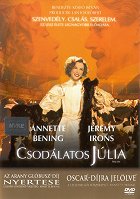Rendező:
István SzabóForgatókönyvíró:
Ronald HarwoodOperatőr:
Lajos KoltaiZeneszerző:
Mychael DannaSzereplők:
Michael Gambon, Annette Bening, Leigh Lawson, Shaun Evans, Mari Kiss, Jeremy Irons, Juliet Stevenson, Miriam Margolyes, Max Irons, Michael Culkin (több)Tartalmak(1)
London, 1938. A 45 éves, népszerű és körülrajongott színésznő, Júlia Lambert a teltházas évad vége felé váratlanul bejelenti férjének, hogy leáll, kikészült, pihenni vágyik. Úgy érzi, neki már semmit sem tartogat az élet. Félő, hogy emiatt színházi vállalkozásuk, amelybe a Júlia-imádó Dolly de Vries a pénzt, a férj, Michael a szakértelmet és Júlia a tehetségét fekteti, tönkre megy. Ebben Jimmy sem segíthet, az egykori, rég halott színházi rendező, az örök barát, aki valahányszor "megjelenik", ha Júlia elbizonytalanodik, hogy emlékeztesse: neki a színház az élete. Ekkor lép életükbe Tom Fennel, az amerikai fiatalember, aki nem sokáig titkolja, hogy kamaszkora óta szerelmes Júliába. Az asszony maga sem hiszi, de a fiatalember szenvedélye magával ragadja: viszontszeret, életkedve visszatér, habzsolja az örömöket, ajándékokkal halmozza el kedvesét. Őrülten féltékeny lesz, amikor az Júliáék fiával egy éjszakai kiruccanáson megismerkedik egy ifjú színésznővel. Pedig Tom már Avice-be szerelmes, ejti Júliát, de protekciót kér tőle a lány részére az új darab Sybill szerepéhez. Júlia, becsapva, megalázva most igazán mélyponton van. Ekkor találja meg a hangot tizennyolc éves fiával, Rogerrel, aki gyerekkora óta hozzászokott, hogy anyja mindig szerepet játszik, s most látnia kell, hogy szenved. Ő átlátott Tom céltudatos törtetésén is, s most leleplezi apja és Avice viszonyát. Júliát mintha kicserélték volna: hadba indul. A próbákon mindent elkövet, hogy a lány gyanútlanul higgyen saját fantasztikus tehetségében és ifjú varázsában, majd a bemutató előadáson, a jelenlévő szerző rémületére "átírja" a darabot. Beviszi a színházba a való életet, négyük életének legújabb fordulatait. Frenetikus sikert arat. Visszahódítja férjét, megsemmisíti vetélytársnőjét és újra ő az egyetlen, a sikeres, a nagyszerű Júlia Lambert. A premierfogadás helyett mégis egy pint sörrel, egyedül ünnepel kedvenc éttermében. (InterCom)
(több)Videók (1)
Recenziók (3)
Julie, or rather Annette Bening, is just divine here, giving a great performance as an ageing theatre actress at the peak of her career. This adaptation of the play titled “Theatre" is really worth seeing, mainly due to the actors, because nothing special really happens story-wise, although the ending certainly works well. Even the directing by István Szabó seems like a record of a sumptuous theatre performance, which in this case is positive.
()
The story of the life of London theater diva Julia Lambert, starring Annette Bening. The setting of the theatrical production and the social elite provides an opportunity to portray the atmosphere of 1939, which is entirely interested in the stories of individual characters and not distracted by politics. Julie is a dominant and modern woman who at first thinks about a theatrical holiday, but then, thanks to a young lover and the subsequent disappointment of her relationship with him, she hatches a plan that will not only satisfy her in her personal life but also bring her outstanding new success on the stage. At the same time, we can follow the story of her gay boyfriend, her husband with whom she maintains a friendly marriage, and the daring Avice Crichton counting on a theatrical career gained through sex. This modern story with an appeal to the uniqueness of a mature woman can serve as an example of healthy emancipation even today. In a sense, it may remind us of another famous role of Annette Bening - the Marquise de Merteuil from Forman's Valmont (1989). It's also interesting how many actors Szabó intertwines in both Being Julia and Sunshine - Miriam Margolyes and Rosemary Harris, for example.
()
Dear, although perhaps a bit too playful (but that is, to a certain extent, a flaw of the genre), it is surprisingly not refreshed by the somewhat strained Anette Bening, but rather by the excellent male actors around her, especially Irons, who is traditionally excellent. It occurred to me that it might be a shame that the story is told from Julie's perspective. If Irons' Michael were the main character caught between two women and the film were presented as a drama (as seen with Irons in a twenty years younger version in "Swann in Love") with a side storyline of Julie, it would be better. The film has a terribly dull passage when Julie is expected to be abandoned and a lengthy part follows in which we are supposed to reach revenge with the heroine, which fortunately fulfills our expectations. I consider the final theater scene and what follows to be an amazing climax of the film, and if the plot had been slightly condensed, it could have been great. The excellent music also deserves praise, whether it's the impressive orchestral accompaniment or the well-executed jazz soundtrack.
()



Hirdetés